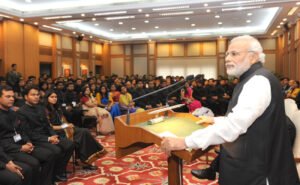An IAS officer forms the bureaucrat level of the administrative hierarchy of a country. The person at the IAS officer level is the executive, as well as advisory. This profile acts as a connecting link between the government and the people. The person holding this responsibility collects the issues and problems through surveys and inspections of the cities and briefs the ministry about the same. These problems form the basis of various reforms and developmental plans the ministry proposes. The IAS officer also takes the responsibility of ensuring that the projects are implemented, as suggested.
Read Also: 10 Qualities that Enable An Aspirant Become an IAS Officer
Therefore, this profile requires an exceptional clarity of mind and complete awareness of the economic, social, and cultural framework of a country. The level of involvement in the developmental aspects of a country makes this position quite a prestigious one. What it takes to be an IAS officer and how this profile changes your life for good, let’s find out.
How to Prepare to Become an IAS officer
A graduation degree in any educational stream is required to become eligible for an IAS officer’s post. The preparations should start well in advance. Serious candidates start their studies right from the entry level of a graduation program. Some prestigious coaching institutes guide the aspirants on various aspects of preparations required for the IAS exam. This exam is conducted in two phases – the first phase is called Preliminary, and the other is called Mains. An aspirant needs clearing the preliminary exam to be eligible for the Mains exam.
The exam involves both multiple-choice questions and those requiring detailed answers. The multiple-choice questions are asked in the preliminary exam. Most of these questions check the general awareness level and general proficiency in the subject. Once they clear both the
exams, the successful candidates are sent to a training center where they train for three years. The training part comprises Foundation and an All-India tour called Bharat Darshan, which enlightens IAS aspirants with the country’s ground realities.
Read Also: Its Time To Train Your Mind! Think Like An IAS Officer
Primary duties of an IAS officer
An IAS officer’s profile includes a lot of office administration (desk job and files supervision works) and touring where the officers go into the designated parts of the district or the State and take stock of action of various nature happening there.
A large part of IAS responsibilities includes the management of affairs assigned. The officer has to ensure that the funds are amply accounted for and that the fair disbursement of funds to the projects and schemes is done. The officer reports to the legislative assembly and keeps the related ministry abreast of all the situations in the assigned areas.
The career graph of an IAS officer
Once the candidate completes all the qualifying exams and training, he or she is put on probation at cadre positions. Basis the performance and the experience gained at this position, the candidates from cadre positions are pulled up to the next level called sub-divisional Magistrate or SDM. They further move to the posts of District Collectors; other similar positions are District Magistrate or District Commissioners.
After serving on these positions, the candidates can get one more promotion to the Head of Departments, which are the same as bureaucrats in the PSUs or state-level administration. From the state government department, the officers are absorbed in central government departments. They can enjoy positions such as Cabinet Secretary, Under Secretary, Joint Secretary, Deputy Secretary, to name important positions.
Every day – a new challenge!
IAS officers have no fixed schedule. They are supposed to do multiple jobs throughout the day. Their reporting time is 9:00 am, and the work can go as late as 9:30 pm. There is quite a possibility that they may require presenting themselves at the site in case of occurrence of any grave situation to tackle. The IAS officers are supposed to carry out several activities comprising of meetings with seniors and subordinates. They go on inspection tours and do close supervision of how the developmental plans are under implementation.
Every day comes with a new challenge. IAS officers are supposed to take firsthand stock of any untoward incident that happened in their area of jurisdiction. The second most important thing that they do is the addressing of grievances and complaints. They need assistants who help them be there wherever they are required. So, on some important days, they don the role of the guest of honor and attend seminars, conferences, inauguration ceremonies, etc.
Best virtues sought after in an IAS officer
By taking a cue from the responsibilities that an IAS officer fulfills, one can arrive upon the attributes the aspirants of civil services ought to have. This list comprises:
- High intelligence level: People eyeing for IAS level jobs need to have an excellent academic record. Their intelligence level should be exceptionally high. It is required to absorb a variety of information that comes their way quickly.
- Unmatched awareness: An IAS officer needs to be fully aware of all the current happenings, and they should be conversant with the historical records of the same. It helps them understand how to connect the dots and carry forward the projects assigned.
- Excellent communication skills: An IAS officer needs to be an expert in formal and informal communications. They should be well conversant with the legal terms and the official drafts’ language. Since they require interacting with people from various backgrounds, they should have the ability to mold themselves according to the need of the situation. Knowledge of multiple languages is a bonus.
- Empathetic approach: IAS officers are public servants primarily. Unless they are empathetic, they will not understand the gravity of the needs of the people they work for. Thus, having an empathetic take on things around them can help them serve better and achieve higher. They also need to have a strong sense of justice.
To sum up, the career of an IAS officer is the most fulfilling one in every sense. The thought of doing something substantial for the self as well as the country keeps the officers motivated.



